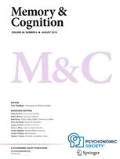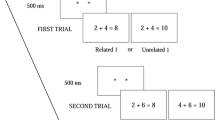Abstract
In two experiments, obligatory activation of arithmetic facts resulted in interference on a simple number-matching task. Subjects were required to verify the presence of a probe number (e.g., 5) in a previously presented pair (e.g., 5+1). Items for which the probe was the sum of the initial pair (e.g., 5+1 and 6) were rejected more slowly than items for which the probe was not the sum (e.g., 5+1 and 3), and this effect was largest at stimulus onset asynchronies of less than 180 msec between the number pair and the probe. The results are consistent with the notion that arithmetic knowledge is represented in an associative network and accessed by means of spreading activation.
Similar content being viewed by others
References
Anderson, J. R (1983)The architecture of cognition. Cambridge, MA: Harvard University Press.
Ashcraft, M. H. (1982). The development of mental arithmetic: A chronometric approach.Developmental Review,2, 213–236
Ashcraft, M. H (1983).Simulating network retrieval of arithmetic facts. Learning Research and Development Center Publication Series (No 1983/10), University of Pittsburgh.
Ashcraff, M. H (1987). Children’s knowledge of Simple arithmetic: A developmental model and Simulation. In J Brsanz, C J. Brainerd, & R. Kail (Eds),Formal methods in developmental psychology: Progress in cognitive development research (pp. 302–338). New York Springer-Verlag.
Ashcraff.M. H. &Battaglia, J. (1978) Cognitive arithmetic: Evidence for retrieval and decision processes in mental addition.Journal of Experimental Psychology: Human Learning & Memory,4. 527–538
Ashcraft, M. H., &Fierman, B A (1982) Mental addition in third, fourth. and Sixth graders.Journal of Experimental Child Psychology,33, 216–234.
Ashcraft, M H., &Stazyk, E. H (1981). Mental addition: A test of three venfication modelsMemory & Cognition,9, 185–196
Campbell, J I. D. (1987) Network interference and mental multiplicationJournal of Experimental Psychology’ Learning. Memory. & Cognition,13, 109–123
Campbell, J. I. D., &Graham, D. J (1985) Mental multiplication skill. Structure, process, and acquisition.Canadian Journal of Psychology,39, 338–366.
Collins, A. M. &Lortus, E. F (1975). A spreading-activation theory of semantic processingPsychological Review,82, 407–428.
Den Heyer, K., Briand, K., &Dannenbring, G. L. (1983). Strategic factors m a lexical-decision task Evidence for automatic and attention-driven processes.Memory & Cognition,11, 374–381.
Dyer, F N. (1973). The Stroop phenomenon and its use in the study of perceptual, cognitive, and response factors.Memory & Cognition,1, 106–120
Favreau, M, &Segalowitz, N. S. (1983) Automatic and controlled processes in the first- and second-language reading of fluent bilingualsMemory & Cognution,11, 565–574
Fischler, I. (1977). Semantic facilitation Without association m a lexical decision task.Memory & Cognution,5, 335–339.
Hamann, M. S, &Ashcraft, M. H (1985) Simple and complex mental addition across developmentJournal of Experimental Child Psychology,40, 49–72.
Kahneman, D., &Chajczyk, D. (1983) Tests of the automaticity of reading: Dilution of Stroop effects by color-irrelevant stimuliJournal of Experumental Psychology Human Perception & Performance,9, 497–509
Kail, R. V, &Bisanz, J (1982) Cognitive development: An information-processing perspective In R Vasta (Ed.),Strategies and techniques of child study (pp. 209–243). New York Academic Press
Kulak, A. G., & Bisanz, J. (1986, June).Developmental changes In magnitude comparison. Paper presented at the annual meeting of the Canadian Psychological Association, Toronto
LeFevre, J, &Bisanz, J (1986). A cognitive analysis of number-series problems: Sources of individual differences m performance.Memory & Cognition,14, 287–298.
Logan, G. D. (1980) Attention and automaticity in Stroop and priming tasks: Theory and data.Cognitive Psychology,12, 523–553.
Logan, G. D (1985) Skill and automaticity: Relations, implications, and future directions.Canadian Journal of Psychology,39, 367–386.
Logan, G D. &Zbrodoff, N. J. (1982). Constraints on strategy construction in a speeded discrimination task.Journal of Experimental Psychology: Human Perception & Performance,8, 502–520.
Miller, K F, Perlmutter, M., &Keating, D. (1984). Cognitive arithmetic: Comparison of operationsJournal of Experimental Psychology. Learning, Memory, & Cognition,10, 46–60.
Moyer, R S., &Landauer, T. K (1967). Time required for Judgment, of numerical InequalityNature,215, 1519–1520
Moyer, R. S., &Landauer, T K. (1973) Determinants of reaction time for digit inequality judgmentsBulletin of the Psychonomic Society,1, 167–168
Muth, K D. (1984). Solving anthmetic word problems: Role of reading and computational skillsJournal of Educational Psychology,76, 205–210
Neely, J. H (1976). Semantic priming and retrieval from lexical memory: Evidence for facilitatory and inhibitory processesMemory & Cognition,4, 648–654
Neely, J H (1977) Semantic priming and retrieval from lexical memory Roles of inhibitionless spreading activation and limited capacity attentionJournal of Experimental Psychology’ General,106, 226–254
Newell, A. (1973) You can’t play 20 questions with nature and Win In W G Chase (Ed.),Visual information processing (pp 283–308) New York Academic Press.
Posner, M I., &Snyder, C. R R. (1975) Facihtation and inhibition In the processing of Signals In P M A. Rabbitt & S. Dorruc (Eds.),Attention and performance V (pp 669–682) London Academic Press
Shiffrin, R. M, &Dumais, S T (1981) The development of automatism. In J R Anderson (Ed.),Cognutive skills and their acquisition (pp. 111–140). Hillsdale, NJ Erlbaum.
Siegler, R S. (1986). Unities in thinking across domains In children’s strategy choices. In M. Perlmutter (Ed),Perspective for intellectual development. Minnesota symposium on child development (Vol 19, pp 1–48) Hillsdale, NJ. Erlbaum.
Siegler, R S., &Shrager, J (1984) Strategy choices In addruon and subtraction How do children know what to do? In C. Sophian (Ed),Origins of cognitive skills (pp 229–293) Hillsdale, NJ Erlbaum
Stazyk, E. H., Ashcraft, M. H, &Hamann, M. S (1982). A network approach to mental multiplication.Journal of Experimental Psychologv: Learrung. Memory, & Cognition,8, 320–335
Winkelman, H J, &Schmidt, J. (1974) Associative confusions In mental arithmetic.Journal of Experimental Psychology,102, 734–736
Zbrodoff, N J, &Logan, G. D. (1986) On the autonomy of mental processes A case study of arithmeticJournal of Experimental Psychology: General,115, 118–130
Author information
Authors and Affiliations
Rights and permissions
About this article
Cite this article
Lefevre, JA., Bisanz, J. & Mrkonjic, L. Cognitive arithmetic: Evidence for obligatory activation of arithmetic facts. Memory & Cognition 16, 45–53 (1988). https://doi.org/10.3758/BF03197744
Received:
Accepted:
Published:
Issue Date:
DOI: https://doi.org/10.3758/BF03197744



